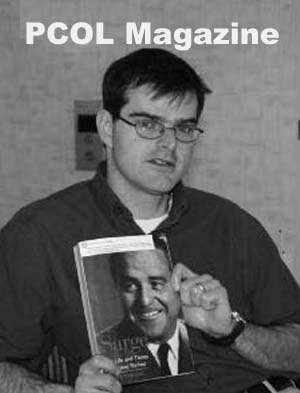
Stossel asked the panelists what they thought of the state of contemporary fiction. Curtis, who probably reads thousands of submissions each year -- there was an interesting tidbit that the summer fiction issue itself recevies like 4,000 entries for about 8 spots -- said that there's never been more good fiction being written, but that it has something to do with the explosion of M.F.A. programs in the U.S. Scott Stosel is the authorized biographer of Founding Peace Corps Director Sargent Shriver.
Scott Stossel, deputy editor of The Atlantic, moderates panel on Why Fiction Matters
Luminato: Why Fiction Matters
Posted: June 15, 2009, 4:55 PM by Mark Medley
If you weren't one of the 150 or so people sitting in the humid Isabel Bader Theatre on Saturday afternoon for Why Fiction Matters, the inaugural presentation stemming from the new partnership between Luminato, Toronto's Festival and Arts and Creativity, and The Atlantic Monthly, don't worry: none of the distinguished panelists came up with an answer.
There were arguments, anecdotes, and explanations, but no concrete answers. It's through no fault of their own, mind you. An hour isn't nearly enough time to tackle such a broad topic. The panelists could have been given a year and still not come to consensus.
Moderator Scott Stossel, deputy editor of The Atlantic, kicked off the discussion by surmising that fiction, perhaps, doesn't matter. "We have dishes to do and laundry to clean" he said, so where does fiction fit in? The task of defending fiction first fell to C. Michael Curtis, the magazine's senior editor, who has been in charge of their fiction program for more than 45 years: "If stories didn't matter, we wouldn't be telling stories all the time," he said.
Tim O'Brien, the author of The Things They Carried and many other works of fiction, argued that "literature has a way of reminding us of things we know in our bones, but in the hurly-burly of life forget."
Anne Michaels, the sole female writer on the panel, said "We both read and write to hold another [person] close." Fiction, she later added, helps us reach places which are otherwise unassaible.
Fellow Canadian Alexi Zentner, who has a story in The Atlantic's summer fiction issue -- a wonderful domestic drama titled Furlough -- but has yet to publish a book, said that yes, there is always going to be a group of people who don't care about fiction, but then again, there's always going to be a group of people who don't care about NASCAR. Zentner also voiced what may be the line of the afternoon: people read non-fiction to be taught, they read fiction to learn. This bit of philosophy was greeted by murmurs of assent all around.
There was discussion of what constitutes good literature. John Grisham, for instance, is one of the world's best selling authors. Doesn't that automatically make him a good writer?
"I wish there was a universal acceptance t what is good literature," said Zentner, "'cause then I'd do it."
Stossel asked the panelists what they thought of the state of contemporary fiction. Curtis, who probably reads thousands of submissions each year -- there was an interesting tidbit that the summer fiction issue itself recevies like 4,000 entries for about 8 spots -- said that there's never been more good fiction being written, but that it has something to do with the explosion of M.F.A. programs in the U.S.
O'Brien said that as long as he reads a good story on a regular basis, fiction is good. He also took a shot at Tom Wolfe, who has been a critic of modern fiction: "He's too busy writing his big, fat, boring books."
It was also stated that there are already more than enough books to last a lifetime; he could demand a moratorium on the publication of new books and still not get through a fraction of the good books already out there.
"As I don't have a book out now," said Zentner, "I'd like to believe we need more books."
Curtis told an interesting story about his former roommate, who was writing a book. One part of the novel was set in 19th century Cairo. The roommate went out and got a history book and fact-checked all the street names, to ensure they would have existed in the year the book was set. The roommate? Thomas Pynchon. The book? V.












